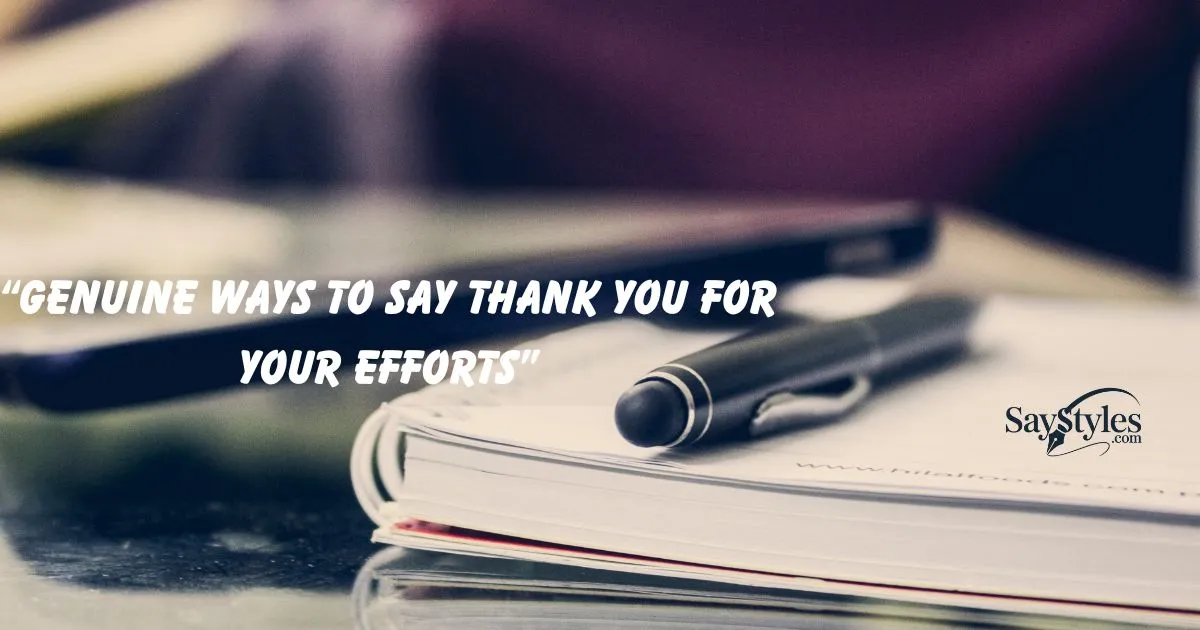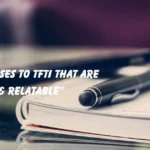“Gratitude turns what we have into enough, and effort into something truly special.” When someone goes the extra mile for you, a simple “thank you” might not feel strong enough. That’s where finding other ways to say thank you for your efforts can really make a difference. I’m here with you as we explore better, warmer, and more meaningful ways to show appreciation.
As someone who truly values kindness and hard work, I believe words carry power. Whether it’s a coworker, friend, or loved one, the right words can express recognition, encouragement, and sincere appreciation all at once. This isn’t just about being polite it’s about letting people know their time and energy didn’t go unnoticed.
In this article, you’ll find unique, easy-to-understand phrases and thoughtful alternatives to thank someone for their efforts. From everyday moments to big achievements, let’s find the best words to show real gratitude in your own voice.
What “Thank You for Your Efforts” Really Means
When someone says “Thank you for your efforts”, they are expressing recognition, appreciation, and respect for the time, energy, or work you put in. This phrase is common in professional settings, teamwork, and formal communication and signals gratitude and acknowledgment of contribution.
List of Ways to Say Thank You for Your Efforts”
- I genuinely appreciate your dedication.
- Your effort has truly made a difference.
- Thank you for your exceptional commitment.
- Your hard work has not gone unnoticed.
- I’m grateful for your unwavering support.
- Thanks for actually doing your job.
- Wow, you didn’t mess this up—impressive!
- You actually did something useful—color me surprised!
- Thanks for not making me do everything myself!
- You did a decent job—kudos, I guess.
- You make working hard look so good—thanks!
- Your effort was as impressive as your smile—thanks!
- I’m grateful for your hard work and your charm!
- Thanks for being amazing at work and making my day!
- You’ve not only done great work but also made it more enjoyable!
- You really stepped up when it counted—thank you.
- Your hustle didn’t go unnoticed—thanks for that.
- Thanks for being the engine behind this.
- Your grind made this happen—seriously, thank you.
- You made the impossible feel easy—thanks a ton.
1. “I genuinely appreciate your dedication.”
Story:
Lena stayed late every night this week to help her team meet a tight deadline. Her attention to detail and energy made a big impact.
When to Use:
Use this when someone puts in consistent effort and sticks with a task until the end.
When Not to Use:
Avoid saying it if the person did very little or wasn’t really involved. It can sound fake.
Example:
Alex says, “Lena, I genuinely appreciate your dedication. You’ve really held this together.”
How to Respond 🗣️
“Thanks, Alex! That means a lot coming from you.”
2. “Your effort has truly made a difference.”
Story:
Sam noticed Jordan helping a new hire feel welcome and confident in the first week. That small gesture changed everything for the new person.
When to Use:
Say it when someone’s work or kindness had a clear, positive outcome.
When Not to Use:
Skip it if the situation didn’t really change or improve because of their action.
Example:
Jordan hears, “Your effort has truly made a difference, Sam. She feels at home now.”
How to Respond 🗣️
“I’m really glad to hear that. Thanks, Jordan!”
3. “Thank you for your exceptional commitment.”
Story:
Amira volunteered every weekend for a local event. She never missed a day and always showed up early.
When to Use:
Use this when someone shows long-term involvement and keeps showing up with full energy.
When Not to Use:
Don’t use it if someone only helped once or wasn’t very involved. It won’t sound real.
Example:
Lucas tells Amira, “Thank you for your exceptional commitment. We couldn’t have done this without you.”
How to Respond 🗣️
“Thanks, Lucas. It’s been great to be part of this!”
4. “Your hard work has not gone unnoticed.”
Story:
Derek quietly stayed behind after meetings, organizing files and cleaning up without being asked. Mia noticed his extra effort.
When to Use:
Say it when someone does background work that often gets ignored but really matters.
When Not to Use:
Don’t say it if no one really saw or felt their work. The praise might seem forced.
Example:
Mia says, “Derek, your hard work has not gone unnoticed. I really see what you do.”
How to Respond 🗣️
“Thanks, Mia. I’m glad someone noticed.”
See also: “Powerful Replies to Say When You Hear Hallelujah”
5. “I’m grateful for your unwavering support.”
Story:
Elijah helped Nora through a stressful time at work by listening, giving advice, and staying calm. He stayed in her corner every day.
When to Use:
Say this when someone shows emotional or personal support during hard times.
When Not to Use:
Avoid it if the person wasn’t actually present or helpful. It can feel empty.
Example:
Nora says, “I’m grateful for your unwavering support, Elijah. You really helped me through this.”
How to Respond 🗣️
“You’ve got it, Nora. Always here for you.”
11. “Thanks for actually doing your job.”
Story:
Jamie was tired of picking up slack until Taylor finally pulled their weight and finished the reports on time.
When to Use:
Use it in a playful, sarcastic way with someone you’re close to when they finally step up.
When Not to Use:
Avoid using it in formal settings or with someone who might take offense easily.
Example:
Jamie says, “Thanks for actually doing your job today, Taylor!”
How to Respond 🗣️
“Hey, miracles happen! You’re welcome.”
12. “Wow, you didn’t mess this up—impressive!”
Story:
Riley gave Morgan an important task with low expectations, but Morgan nailed it.
When to Use:
Use it jokingly when someone surprises you by doing something well.
When Not to Use:
Don’t use it with people who are sensitive or may feel insulted.
Example:
Morgan hears, “Wow, you didn’t mess this up—impressive, Riley!”
How to Respond 🗣️
“I’ll take that as a win!”
13. “You actually did something useful—color me surprised!”
Story:
Alexis, known for slacking off, finally took initiative and fixed a tech issue. Jordan couldn’t believe it.
When to Use:
Use this when someone does something helpful unexpectedly.
When Not to Use:
Avoid using it with coworkers you don’t know well. It can sound rude.
Example:
Jordan says, “You actually did something useful, Alexis—color me surprised!”
How to Respond 🗣️
“Even I’m shocked. Guess I had it in me!”
14. “Thanks for not making me do everything myself!”
Story:
Leah was bracing to handle the entire group project until Mark finally showed up and did his share.
When to Use:
Use this when someone finally helps out instead of leaving you to do all the work.
When Not to Use:
Skip it if the person genuinely couldn’t help or already apologized.
Example:
Leah tells Mark, “Thanks for not making me do everything myself.”
How to Respond 🗣️
“Glad I could save you some stress.”
15. “You did a decent job—kudos, I guess.”
Story:
After weeks of trial and error, Ava finally got the presentation right. Dylan was both impressed and surprised.
When to Use:
Use this when you want to show praise but still keep it casual or teasing.
When Not to Use:
Don’t use it if the person needs sincere support or is feeling down.
Example:
Dylan says, “You did a decent job, Ava—kudos, I guess.”
How to Respond 🗣️
“I’ll take it. That’s the nicest thing you’ve ever said!”
16. “You make working hard look so good—thanks!”
Story:
Chloe saw Max working in the office with confidence and a bit of style, making it look easy.
When to Use:
Use it to compliment someone’s work while also flirting a little.
When Not to Use:
Don’t use it in serious or professional-only environments.
Example:
Chloe smiles, “You make working hard look so good, Max—thanks!”
How to Respond 🗣️
“Well, I’m trying to impress!”
17. “Your effort was as impressive as your smile—thanks!”
Story:
Zane helped Emma organize an entire event with full focus, and his charm didn’t go unnoticed either.
When to Use:
Perfect when you want to mix flattery with appreciation in a sweet way.
When Not to Use:
Avoid using this if the person might misread your intentions in a professional space.
Example:
Emma says, “Your effort was as impressive as your smile, Zane—thanks!”
How to Respond 🗣️
“You just made my day!”
18. “I’m grateful for your hard work and your charm!”
Story:
Taylor helped Casey stay calm through a rough deadline, always adding a little humor and warmth.
When to Use:
Use it when someone not only works hard but also brings good energy.
When Not to Use:
Don’t use it in overly formal meetings or serious work reviews.
Example:
Casey says, “I’m grateful for your hard work and your charm, Taylor.”
How to Respond 🗣️
“Glad I could help—and make it fun too!”
19. “Thanks for being amazing at work and making my day!”
Story:
Noah covered for Mia during a busy shift, and his cheerful attitude turned a rough day into a good one.
When to Use:
Use it when someone’s effort and personality both help you out.
When Not to Use:
Avoid saying this in strict or rule-heavy workplaces unless you’re close.
Example:
Mia tells Noah, “Thanks for being amazing at work and making my day!”
How to Respond 🗣️
“Anytime, Mia. That’s what teammates are for!”
20. “You’ve not only done great work but also made it more enjoyable!”
Story:
Rachel noticed Liam not only meeting his goals but also bringing fun and laughter into every meeting.
When to Use:
Say this when someone brings both productivity and good vibes to the group.
When Not to Use:
Don’t use this if the person distracted others or didn’t deliver on time.
Example:
Rachel says, “You’ve not only done great work, Liam, but also made it more enjoyable!”
How to Respond 🗣️
“That’s the best kind of feedback. Thanks, Rachel!”
21. “You really stepped up when it counted—thank you.”
Story:
Chris wasn’t sure who would take charge during a sudden rush, but Jordan jumped in and handled it like a pro.
When to Use:
Use it when someone rises to the occasion in a stressful or unexpected moment.
When Not to Use:
Avoid using it if they were just doing something minor or routine.
Example:
Chris says, “You really stepped up when it counted, Jordan—thank you.”
How to Respond 🗣️
“I’ve got your back, Chris. Anytime!”
22. “Your hustle didn’t go unnoticed—thanks for that.”
Story:
During a busy week, Tessa noticed that Noah stayed late, skipped breaks, and stayed sharp the whole time.
When to Use:
Use this when someone shows serious effort and keeps pushing through.
When Not to Use:
Skip it if the person wasn’t really hustling or only did the basics.
Example:
Tessa says, “Your hustle didn’t go unnoticed, Noah—thanks for that.”
How to Respond 🗣️
“Glad it helped, Tessa!”
23. “Thanks for being the engine behind this.”
Story:
Sophie quietly handled the behind-the-scenes work that kept the project running. Liam finally realized how much she did.
When to Use:
Say it when someone was the driving force behind a win or success.
When Not to Use:
Don’t use it if they didn’t play a big part or just followed instructions.
Example:
Liam says, “Thanks for being the engine behind this, Sophie.”
How to Respond 🗣️
“Aw, that means a lot. Thanks, Liam!”
24. “Your grind made this happen—seriously, thank you.”
Story:
Amber stayed focused every day, even when others were slowing down. Her dedication got the project over the line.
When to Use:
Use it when someone puts in the work that truly leads to a result.
When Not to Use:
Avoid it if they weren’t really that involved or did the bare minimum.
Example:
Jordan says, “Your grind made this happen, Amber—seriously, thank you.”
How to Respond 🗣️
“Appreciate that, Jordan. I gave it my all.”
See also: ““Best Responses to TFTI That Are Witty & Relatable”
25. “You made the impossible feel easy—thanks a ton.”
Story:
Ben watched as Mia turned a messy situation into a smooth, finished product without complaining once.
When to Use:
Use this when someone solves tough problems with calm and skill.
When Not to Use:
Don’t say it if the task was basic or didn’t require much thought.
Example:
Ben tells Mia, “You made the impossible feel easy—thanks a ton.”
How to Respond 🗣️
“Wow, thanks Ben. That really means something.”
How These Clever Responses Actually Work
Clever responses to “Thank you for your efforts” work by accepting appreciation with professionalism and humility. Effective replies can be polite, confident, or appreciative, depending on context.
Using cues like professional acknowledgment, gracious reply, respectful response, and engaging comment ensures the interaction feels genuine, socially appropriate, and positively reinforcing without extra wording.
Top 10 Editor Choice Responses
- I truly appreciate all the hard work you put in.
- Your dedication doesn’t go unnoticed.
- Thank you for going above and beyond.
- I’m grateful for your tireless efforts.
- Your contribution has been invaluable.
- Thanks for putting in so much effort.
- I really value everything you’ve done.
- Your hard work means a lot to me.
- Huge thanks for your commitment.
- Appreciate the energy you’ve brought to this.
Conclusion
Expressing gratitude is an essential part of fostering positive relationships, when in the workplace, among friends, or with family. By going beyond a simple “thank you,” you can show a deeper level of appreciation that not only acknowledges the effort but also encourages continued dedication and hard work.
When you choose a casual or formal expression, the key is sincerity. Let these varied phrases help you convey your gratitude in a way that feels authentic and meaningful.
Remember, a little appreciation goes a long way in motivating others and building strong, lasting connections.

I’m Lily Hart, the Admin behind the engaging responses at SayStyles.com! With a knack for blending wit and warmth, I turn every piece of writing into something memorable. From clever advice to fun comebacks, I’m here to make sure every response leaves you smiling and thinking.






